
- MARKETPLACE
- DOWNLOAD BUSINESS KIT

Download Liquor Store Business Plan Sample Template + Doc
Want to open a neighborhood liquor store? This how-to guide gives proven business plan templates you can download and update for your future business in addition to providing tips so you have the best possible chance of success. Ready to get into the real-deal business planning for a liquor shop? Let’s get started.
In this guide, we’ll help you draft an independent liquor store business plan and provide sample templates so you can participate in the $59+ billion industry in the United States. Here’s an outline of the guide so you can jump to the section that interests you the most.
Introduction

Liquor store in Las Vegas.
Introductions are not written for formality’s sake. They’re there to inform the reader and give a bird’s eye view of what your liquor store business is so they’ll know what to expect when they continue to read your business plan.
Everyone understands the basics of a liquor business so you don’t need to go deep into the basics of this. But you should provide context into what makes your retail location different from everyone else locally. Will you specialize in wines? craft beers? Do you offer in-store tastings? Will you have a drive-thru window ?
Here’s an example:
Bottoms Up! is a 3,000 sq. foot liquor store located in Long Island. Married couple Lisa and Sam are the owners of this small business that carries a line of alcoholic and non-alcoholic beverages that’s open from Mondays to Saturdays.
Bottoms Up! will feature the largest selection of local craft beer selections within a 50 mile radius of our store. We will be a meeting ground for craft beer lovers with in-store tastings and educational events. We will also provide delivery of craft beer within 15 minutes of our retail store free of charge to consumers with a $50 minimum purchase. We will also embrace technology, including online ordering to make our store the obvious choice for customers.
With this brief introduction, you can already pinpoint major details such as the name of the business, the location, the type of ownership, the proposed store schedule, and the inventory they’ll be carrying. This is the first step in casting your vision for the retail or online store.
Executive Summary
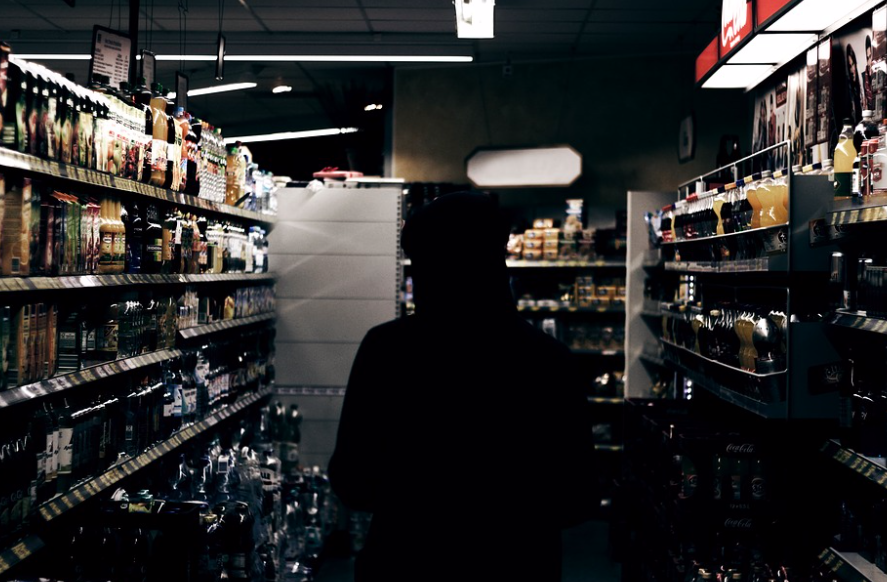
Inside a liquor store.
We know just how exciting it is to dive into the technicalities of your liquor store business and explain the product line and concept at once. But let’s ease it all in first by starting with an executive summary.
This section of the business plan will include a brief introduction about your liquor store, a short company description to discuss the background of your business, the services you offer, and the target customers you’ll be catering to.
An outside party like an investor or partner should be able to understand the nuts and bolts of the business after reading the executive summary and have some conclusions or recommendations based on the research found inside the document.
Buttom’s Up is a liquor store serving a wide selection of wines, hard liquors, and tequilas, but our specialty is craft beer. Craft beer is a rapidly growing part of the beer market now making up 25% of total beer sales according to industry reports. Craft beer drinkers are typically a higher income demographic than typical beer customers.
Our goal is to create a community hub for this growing demographic of drinkers and provide a higher-level of service other retailers aren’t able to offer. Here’s what makes us different:
- We offer free delivery within 15 miles of our retail store on orders over $50. This option will add a level of convenience that traditional liquor stores don’t offer. We will provide deliveries on Fridays and Tuesdays only to make the logistics simpler and cut cost.
- We will offer in-store tastings and invite representatives into our store from local breweries to provide free educational opportunities.
- We have an app that will allow customers to order product online 24/7. These orders can be picked up at our location or delivered on Tuesday or Friday.
Company Description
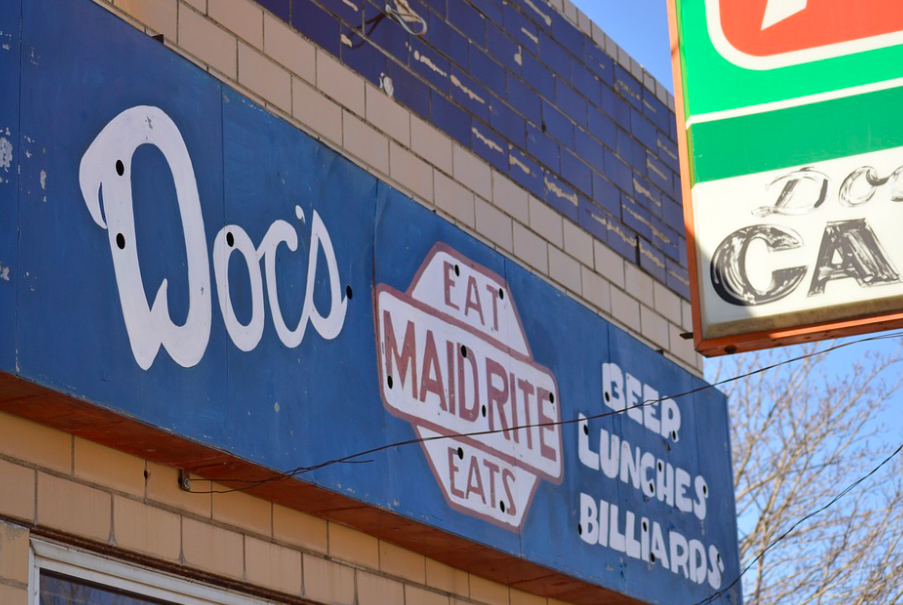
The local beer store.
A company description is simply a little background on the operations behind your new liquor store business. Let’s take Bottoms Up! for example. You already know that a married couple owns the store. You can then provide why they decided to put up such a business.
It may be their experience from being bartenders when they were young or their love for wines. You can also describe their roles such as who will be doing the managing and who will be in charge of purchasing supplies. Again, you don’t need to get too deep into this. Just a brief description will do. This should not exceed more than one page in length.
Related Reading: 148 Brilliant Liquor Store Name Ideas You Can Use
Mission Statement
To strive for success, have your business focus on a mission statement that you can rally around. This mission statement should be shared regularly with guests and future employees alike. This is not something to write down in a business plan and forget about. The mission statement should guide all major decisions for the business.
Here’s a mission statement example for Bottoms Up!: Our mission is to provide to become a gathering place for craft beer lovers to connect and discover new beverages. We also want to support the local brewing community by helping others discover the local beer options that are available and support the local economy. Our mission is to Bottoms Up! also aims to provide avenues for their customers to buy online so they can enjoy our products with the click of a button.
With this mission statement, you can already tell that Bottoms Up! aims who they plan to support and how they’ll make sure their store is always online so that their customers can order with just one click away.
In writing your mission statement, make sure it’s achievable and can be practiced throughout your operations. You will build the operation plan around your mission statement.
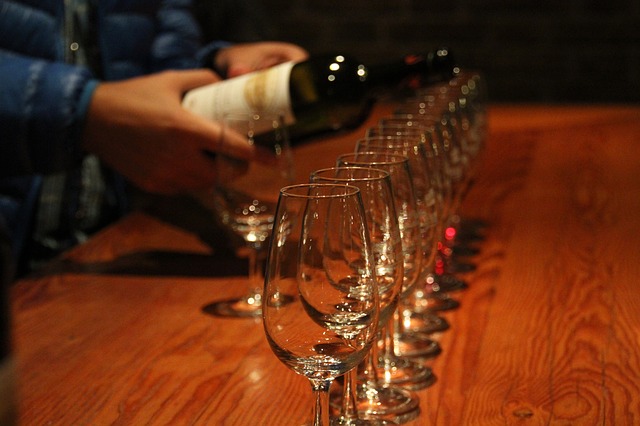
Tasting events can be an effective way to bring in new customers to your shop.
Give a brief account of the services you’ll be providing in your liquor store business. Here are a few you can include:
- Free delivery within a certain distance
- Online payments
- Mobile bar (for events)
- Cocktail classes
- Taste testing
We know how excited you are to get into this one by one but save it for the Product Line and Services section later. For now, keeping your readers informed of the services you’re offering is enough.
Customer Focus
Knowing which customers you’ll be catering to will help form your brand better. This is also where you can get targeted advertising ideas. As you know, Bottom’s Up isn’t trying to market to everyone in their town. They’ve identified the craft beer drinker as their ideal customer. This makes marketing much simpler.
List your customer focus down just like you did in the services section above and save all the detailed explanation for later on in the Target Market section.
Writing down the concept for your liquor store business is one of the fun parts of the business plan. All the ideas you’ve had stuck in your head can now be organized into a formal plan. We encourage you to get in as many details as you can.
Many will agree that when you write down the company concept, you’ll come to realize what works and what doesn’t so you can improve your business further.
Market Analysis

Conduct research on the demographics and income of your market.
Analyzing the liquor store businesses around you is going to give you an edge over all your competitors. It’s like going into battle. You have to know what to expect and who your competition is otherwise you’ll start out unprepared and end up losing more than what you expected.
In our market analysis section, take the time out to explore the industry, your competition, and expound on the target market for your business to become successful.
One simple step you should take in your market analysis is to visit other liquor store competitors in your area. When you visit these stores, make a list of what you like and don’t like about their business.
We also recommend spending time outside of these retail locations to track how many customers are coming in and out of the establishment. What do their customers look like? Does this seem like a profitable concept? Taking the time to observe and take notes on other businesses is one of the best ways you can get a hold on what’s working in a market. It doesn’t cost you anything to complete this step either aside from time.
Management Structure
Management structures serve as a guideline for you as the owner and for your entire personnel. It’s important to set clear roles and boundaries so that no task overlaps with the other and no redundancies happen. It’s also to avoid conflicts in the workplace.
Here is a proposed management team for you to consider hiring:
- Store Manager
- Sales and Marketing Staff
- Inventory Team
- Delivery Team
The number of people you hire depends on how big your liquor store is going to be. If you’re just going to be a small store then there’s no need to hire so many people so you don’t spend too much on the payroll. Many first time liquor store owners start out with only one or two part-time employees to keep costs low.
Target Market
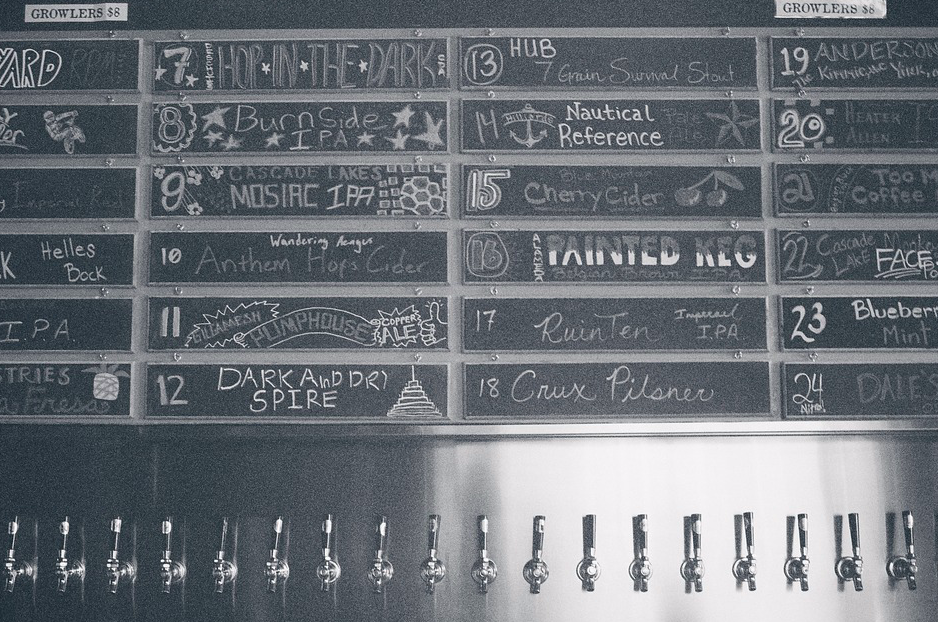
What does your dream customer want?
Knowing which customers you’re targeting for your business makes it easier for you to form your brand. Wine lovers differ from cocktail drinkers. Likewise, there is a different crowd for artisanal beer lovers and just regular beer drinkers. Knowing your target market helps you conceptualize better and list down the products you’re going to sell.
Industry Analysis
Though we’ve pointed out earlier that liquor is enjoyed on every occasion, you’d still need to do an industry analysis on whether or not it’s feasible in the location you’re going to set it up.
You might just find the market oversaturated in your area and it would be advisable to put up your business elsewhere. Or, you might just find your proposed area to be the perfect location. Either way, to know these things, conducting an industry analysis is always helpful.
Doing this type of research will be time consuming, but it’s 100% worth it. The last thing you want to do is open a more high-end bottle shop in a low-income neighborhood. This analysis can help you avoid making the wrong decision.
Competitive Analysis
As a sole liquor store, you will have competition over a lot of other shops, even the ones that don’t even sell liquor as a main item. Treat the grocery stores with their small wine section as a competitor.
Do the same for convenience or grocery stores that have a bit of overlap with your business. List down their strengths and their weaknesses and write down yours as well so you know what you already have and what you’re lacking so you can fill in those spaces.
Product Line and Services
In this section, you can finally write down all the beverages you wish to sell in your liquor store. Include the prices so you can get a gist of how much you’ll be spending to order in supplies. Remember that wholesalers get a discounted price than just stuff you buy in retail.
You can also include more than just drinks. You can include wine glasses, shot glasses, margarita glasses. You can also add different accessories such as wine aerators or corkscrews.
Audio Lesson: How I Started a Craft Brewery for $50,000 and How You Can Do the Same
As for services, do you wish to provide cocktail classes once a month? This could help reel in a loyal list of customers who constantly check out your products. Are you up for a mobile bar? This could be a gig you can do during events such as weddings.
What should be clear in this section is that by the end of writing all of this down, you know what your product line is and whether or not you can find a reliable supplier for all of these. This part of the business plan will be especially important if you’re seeking money from investors or a bank. The anticipated cost / profit from each sale is something every lender will need to understand.
Sales and Marketing
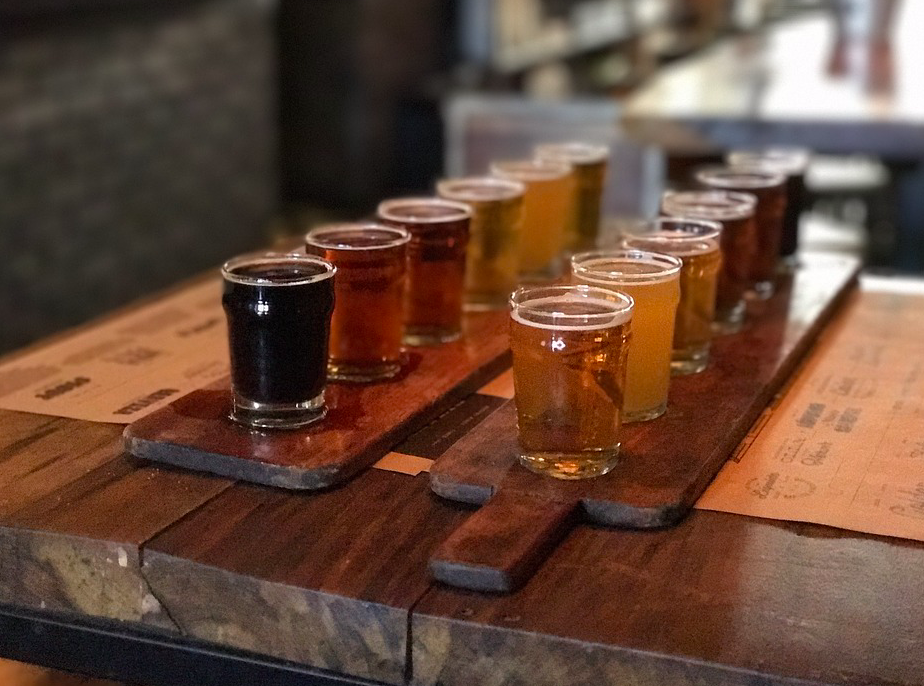
Craft beer consumption has become a global phenomenon.
One big question to ask yourself is how are you going to market your liquor store? Will you be putting an ad out on the local newspaper or place a nice jingle on the radio for the listeners? Whatever your strategy may be, write your plans down here.
You may also like to consider marketing your liquor store using the following platforms:
- Social Media
- Joint venture events with local breweries or wineries
- Radio Stations
- Tie-ups with bars
- Monthly giveaways
- Partnerships with catering services
- Special drinks classes
With these strategies, your business is sure to get a nice growing niche of loyal customers in your area.
Financial Plan
Having a financial plan on the ready helps you figure out how much capital you need to put up your business, the expenses you’re going to make, and how much do you need to make on a daily basis to achieve break-even. Yes, it’s going to get a little technical. But this is what operating a business is all about.
But know that we’re only looking out for you by saying that this is why it’s important to do this plan before starting on your operations so you know what to expect.
Funding Request
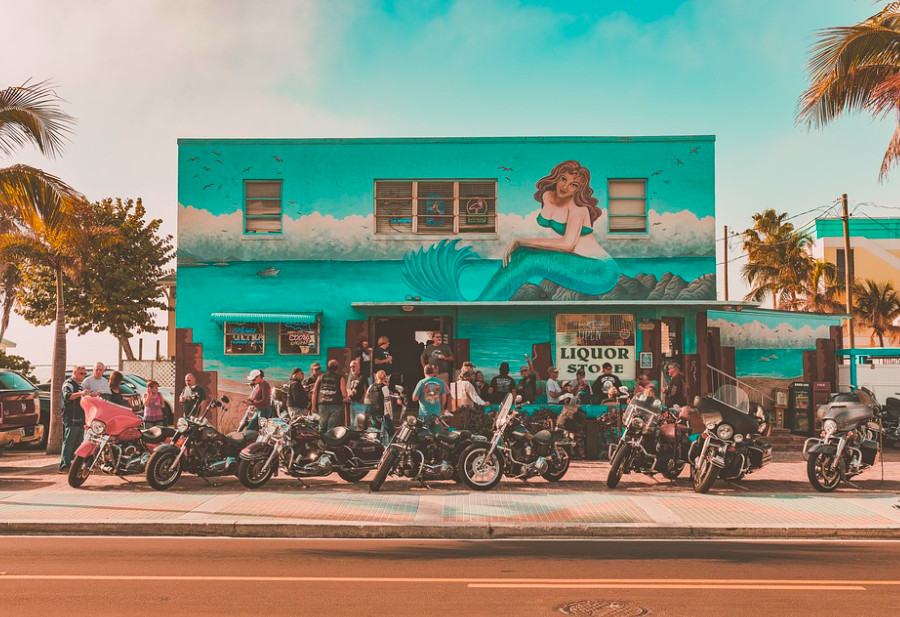
Outside a biker bar and liquor shop.
Some people start a business by tapping into savings. Others take out loans from the bank while some invite investors to help them start up their small business. Crowdfunding is another option used by many new food and beverage founders. In this section of the business plan, write down how and where you’re going to get the money to fund your liquor store.
One reason why you’re writing down this business plan is for this very purpose. For instance, when you loan from banks, they might ask you what your strategies are in putting up a liquor store. This is when you present to them the business plan you’re writing. It is to help convince them that the business you’re going to start is profitable and deserves to see the light of day.
Attention Founders: Join Our Community of 40,000+ Food and Beverage Entrepreneurs and Get our Free Business Plan Canvas
It’s also the same thing with investors. This business plan is going to be read by people who will help you see your liquor store come to fruition so make it as easy to understand as possible with all the necessary details jotted down.
Financial projections
You’ll want to know whether your liquor store I going to be profitable or not. In this section, list down all the major expenses such as:
- Rental space
- Construction materials
- Refrigerated cabinet displays
- Wine chillers and displays
- Point-of-Sale system
- Cash registers
- Electricity
- Off-sale liquor licenses (these can be very expensive depending on where you plan to open)
- Business licenses
- Vans or trucks for delivery
Don’t forget the proposed monthly payroll for your staff and the electricity and water bills. With all these factors, you can compute your price range for your products and services and the targeted sales for the day to reach break-even.
Operational Plan
To make sure that your plans are going to happen, write down a schedule of the tentative dates of when you plan to execute all this.
Here is an example:
Date Plan [Insert Date Here] – Process all business documents and permits for your liquor store.[Insert Date Here] – Start construction.[Insert Date Here] – Start hiring and training of staff as well as marketing the business.[Insert Date Here] – Start operations for the liquor store.[Insert Date Here] – Reach break-even.
It does not have to be a detailed operational plan but it does help guide you on the steps you need to take to get things going.
Don’t forget the appendix! This section will hold all the permits, copy of the liquor license, business documents, designs of your store, and all other documents you acquired in the process of putting up your liquor store business.
Download Liquor Store Business Plan Sample Template
- Liquor Store Business Plan Template PDF
- Liquor Store Business Plan Template Word Doc
- The more your business engages with the customers, the good will you’ll build. Those cocktail classes you hosted? Customers will remember where they learned these tips and spread the word about the services you’re offering. It’s all about interacting with them so make sure to include that in your marketing strategy.
- Get educated on the different types of drinks. Don’t just put up a liquor store business without understanding the types of drink that are growing in popularity. For example, hard seltzers is an area of growth right now. Listen to feedback from customers on the types of alcoholic beverages they prefer over time.
Liquor stores will continue providing an important service to local communities. When consumed responsibly, they make events more relaxing, fun, and act as a social lubricant. With your careful and detailed planning on this business, your liquor shop can be a profitable business longterm.
If you’re serious about opening a liquor store, be sure to join our community of beverage entrepreneurs . When you sign up, you’ll get access to our weekly case studies that include revenue numbers from different businesses.
Want to start your own food business?
Hey! I’m Brett Lindenberg, the founder of Food Truck Empire.
We interview successful founders and share the stories behind their food trucks, restaurants, food and beverage brands. By sharing these stories, I want to help others get started.
If you liked this story, sign up for our newsletter that includes our food business startup kit and most popular interviews sent straight to your inbox.
Know someone interesting that should be interviewed on the website? Tell us about them here.
About the Author: Brett Lindenberg
Related Posts
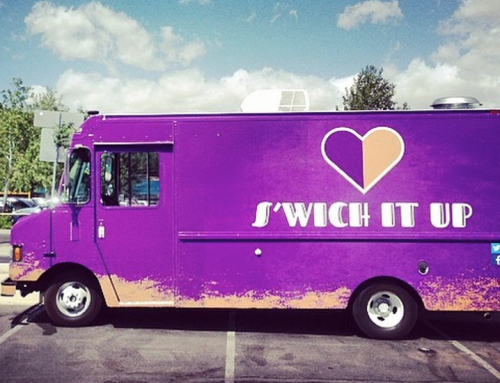
How to Start a Food Truck Business in 8(ish) Steps

Legit Pitch Scripts for New Vending Machine Locations
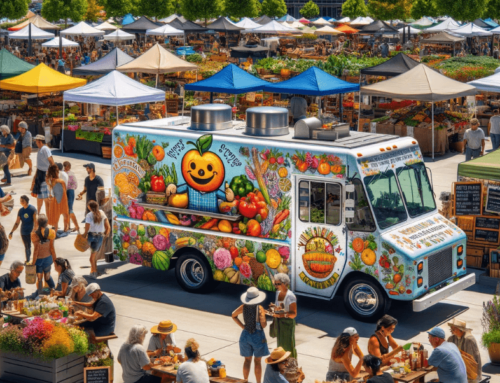
9 (Profitable) Locations to Park a Food Truck
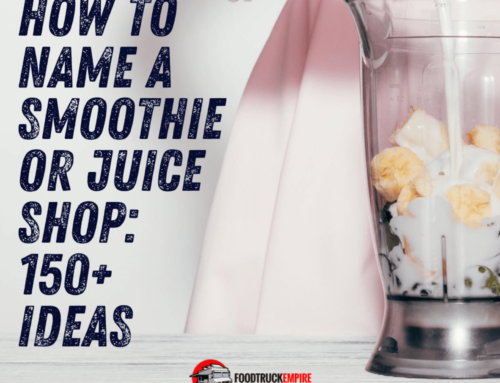
Blend & Brand: 1005+ Smoothie Shop Name Ideas You’ll Remember
Liquor Store Business Plan Template
Written by Dave Lavinsky
Business Plan Outline
- Liquor Store Business Plan Home
- 1. Executive Summary
- 2. Company Overview
- 3. Industry Analysis
- 4. Customer Analysis
- 5. Competitive Analysis
- 6. Marketing Plan
- 7. Operations Plan
- 8. Management Team
- 9. Financial Plan
You’ve come to the right place to create your liquor store’s business plan.
We have helped over 100,000 entrepreneurs and liquor store owners create business plans and many have used them to start or grow their liquor stores.
Sample Business Plan for a Liquor Store
Below are links to each of the key elements of a liquor store business plan template:
- Executive Summary – The Executive Summary is the cornerstone of your business plan. This concise overview should encapsulate your liquor store’s core concept, financial projections, and strategic goals.
- Company Overview – The Company Overview delves deeper into your liquor store’s identity. Clearly articulate your business concept, mission, and vision. Detail your legal structure, ownership, and location in a comprehensive company description.
- Industry Analysis – In the Industry Analysis section, conduct a thorough examination of the liquor industry’s growth potential including key trends, potential market size, and competitive landscape.
- Customer Analysis – Develop a comprehensive profile of your target customer. Identify their demographics, psychographics, buying habits, and consumer preferences.
- Competitive Analysis – Assess your direct competitors (other liquor stores) and your indirect competitors (grocery stores and convenience stores) by analyzing their strengths and weaknesses. Determine your competitive edge and how you will position your liquor business in the market.
- Marketing Plan – In the Marketing Plan section, outline your marketing strategies for reaching and engaging your target audience. Define your marketing goals, target market, and messaging. Develop a comprehensive marketing mix, including product, price, place, and promotion.
- Operations Plan – The Operations Plan outlines the day-to-day business operations of your liquor retail store. Describe your store layout, inventory management system, and purchasing process. Detail your staffing requirements, employee training programs, and operational procedures.
- Management Team – The Management Team section highlights the expertise and experience of your leadership team. Clearly define each team member’s role and responsibilities. Showcase the team’s qualifications and how their skills align with the business objectives.
- Financial Plan – In the Financial Plan, present a comprehensive financial overview of your liquor store. Include a projected profit and loss statement, balance sheet, and cash flow statement. Detail your startup costs, operational costs, and revenue forecasts.
Next Section: Executive Summary >
Free Liquor Store Business Plan Template PDF
You can download our free liquor store business plan template PDF here. This is a free template you can use to create your own liquor store business plan. You can easily complete your liquor store business plan using our Liquor Store Business Plan Template here .

Liquor Store Business Plan FAQs
What is a liquor store business plan.
A liquor store business plan is a plan to start and/or grow your liquor store business. Among other things, it outlines your business concept, identifies your target customers, presents your marketing strategy and details your financial statements .
What are the Steps To Start a Liquor Store Business?
Starting a new liquor store business can be an exciting endeavor. Having a clear roadmap of the steps to start a business will help you stay focused on your goals and get started faster.
1. Develop A Liquor Store Business Plan – The first step in starting a business is to create a detailed liquor store business plan that outlines all aspects of the venture. This should include market research regarding the liquor industry , potential target market size, the services or products you will offer, competitive pricing strategies and a detailed financial forecast.
2. Choose Your Legal Structure – It’s important to select an appropriate legal entity for your liquor store business. This could be a limited liability company (LLC), corporation, partnership, or sole proprietorship. Each type has its own benefits and drawbacks so it’s important to do research and choose wisely so that your liquor store business is in compliance with local laws.
3. Register Your Liquor Store Business – Once you have chosen a legal structure, the next step is to register your liquor store business with the government or state where you’re operating from. This includes obtaining a liquor license and permits as required by federal, state, and local laws.
4. Identify Financing Options – It’s likely that you’ll need some capital to start your liquor store business, so take some time to identify what financing options are available such as bank loans, investor funding, grants, or crowdfunding platforms.
5. Choose a Location – Whether you plan on operating out of a physical location or not, you should always have an idea of where you’ll be based should it become necessary in the future as well as what kind of space would be suitable for your operations.
6. Hire Employees – There are several ways to find qualified employees including job boards like LinkedIn or Indeed as well as hiring agencies if needed – depending on what type of employees you need it might also be more effective to reach out directly through networking events.
7. Acquire Necessary Liquor Store Equipment & Supplies – In order to start your liquor store business, you’ll need to purchase all of the necessary equipment (shelving, cash registers, locked cabinets, etc.) and key suppliers to run a successful operation.
8. Market & Promote Your Business – Once you have all the necessary pieces in place, it’s time to start promoting and marketing your liquor store business. This includes creating a website, utilizing social media platforms like Facebook or Twitter, and having an effective Search Engine Optimization (SEO) strategy. You should also consider traditional marketing techniques such as radio or print advertising.
Learn more about how to start a successful liquor store business, or grow your existing liquor store:
How to Open a Liquor Store Business
Other Business Plan Templates
Nail Salon Business Plan Template
Bakery Business Plan Template
Coffee Shop Business Plan Template
Food Truck Business Plan Template
Event Venue Business Plan Template
- Sample Plans
- Food, Beverage & Restaurant
Liquor Store Business Plan
Planning to open a liquor store? Use this detailed business plan example and download our free template to cover all the essential sections of your liquor store business plan.
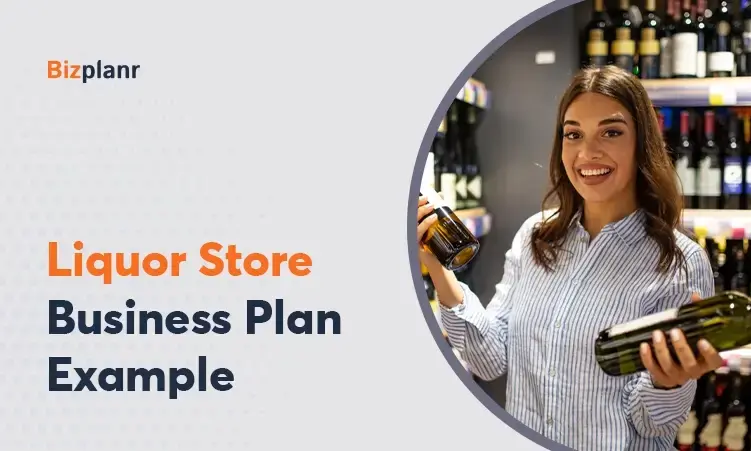
Did you know that the U.S. liquor industry is a multi-billion dollar market, with Americans spending over $250 billion annually on alcoholic beverages? Cha-ching! Clearly, this presents a golden opportunity for entrepreneurs with a passion for fine wines, craft beers, and premium spirits.
However, even with a strong demand and high profitability, you have to consider that there are more than 37,000 liquor stores in the U.S. This means you’ll need a smart strategy and a solid business plan to stand beat them.
So, to help you with the same, we have a detailed liquor store business plan example that will help you to get started.
Liquor Store Business Plan Example
Crafting a solid business plan plays an important role in the success of your liquor store. Let’s explore the Premium Spirits Liquor Store and get practical insights to create a detailed plan for your liquor store.
- Executive summary
Business name: Premium Spirits Liquor Store
Premium Spirits Liquor Store focuses on selling a diverse selection of top-notch alcoholic drinks like wines, spirits, craft beers, and unique imported beverages. Situated in Austin, the store strives to offer a top-notch shopping experience with carefully chosen products, well-informed employees, and a friendly, elegant atmosphere.
Mission statement
To offer a curated selection of high-quality alcoholic beverages, providing exceptional customer service and fostering a welcoming environment for all customers.
Vision statement
To become the leading liquor store in Austin, known for our exceptional product range, knowledgeable staff, and superior customer experience.
- Market analysis
Premium Spirits Liquor Store caters to individuals who are 21 years old and above, including aficionados of high-end wines and spirits, occasional drinkers, and those in search of distinctive and high-grade alcoholic drinks.
Major rivals consist of Austin Wine Merchant, Twin Liquors, and The Austin Shaker. Premium Spirits Liquor Store sets itself apart with an expanded product range, tailored customer service, and an enhanced shopping atmosphere.
Organization and management:
Nash Rivers (Owner/General Manager): Oversees operations, strategic direction, and financial health.
Lyla Compton (Marketing Director): Develops and implements marketing strategies.
Garrett Snow (Operations Manager): Manages day-to-day operations and staff.
Zachary Flynn (Inventory Manager): Handles inventory and supplier relationships.
Amelia Pike (Events Coordinator): Plans and executes in-store events.
Products or services:
Wide Selection of Wines: Curated collection from renowned vineyards.
Premium Spirits and Liquors: Extensive range of high-quality spirits.
Craft Beers : Diverse selection from local and international breweries.
Specialty and Imported Beverages: Unique liqueurs, aperitifs, and mixers.
Gift Baskets and Hampers: Customizable gift options for any occasion.
- Marketing and sales strategy
Leverage social media platforms, targeted online ads, in-store events, and local collaborations.
Offer a membership and loyalty program, maintain a professional website with online ordering and delivery, and engage with the community through sponsorships and events.
Competitive and value-based pricing strategies, with a focus on personalized customer service and attractive product displays.
- Financial projections
At our Liquor store, we’re expected to grow steadily over the next three years. Here, we've shown the revenue and profit margins that reflect our solid business model and market demand.
- Revenue projections
- Funding request
Seeking initial funding of $100,000 from personal savings and a small business loan. Funds will be used for inventory purchases, store setup, marketing expenses, and initial operating costs.
- Business description
Premium Spirits Liquor Store was conceived out of a passion for high-quality alcoholic beverages and a commitment to providing an unparalleled shopping experience.
The store is designed to cater to a diverse clientele, from connoisseurs seeking rare finds to casual drinkers looking for their favorite brands. The founders identified a gap in the market for a liquor store that combines a premium product range with personalized customer service and a sophisticated shopping environment.
Business concept
Premium Spirits Liquor Store differentiates itself by providing a wide range of alcoholic drinks such as wines, spirits, craft beers, and specialty imports.
The layout of the store is created to be welcoming and practical, motivating customers to explore and find new items. Expert staff members are available to offer knowledgeable suggestions, guaranteeing that each customer discovers precisely what they seek.
Goals and objectives
Short-term goals
- Successfully launched the store and established a strong brand presence in Austin.
- Build a loyal customer base through exceptional service and a diverse product range.
- Achieve initial sales targets and positive customer feedback.
Long-term goals
- Expand the product range to include more exclusive and hard-to-find items.
- Increase market share by becoming a go-to destination for premium alcoholic beverages.
- Explore opportunities for growth, including additional locations and online sales.
Core values
- Quality: Commitment to offering only the highest quality products.
- Customer service: Providing personalized and knowledgeable service to all customers.
- Community: Engaging with the local community and supporting local producers.
- Integrity: Operating with transparency and ethical practices in all business dealings.
The alcohol beverage sector is thriving and evolving, fueled by growing demand for high-quality and artisanal products. The market offers a variety of items, including wines, spirits, beers, and specialty beverages.
Over the past few years, there has been a clear movement towards premiumization, as consumers are increasingly willing to invest in superior quality and distinctive products. The market has been greatly influenced by the increased popularity of artisanal and locally made products, as well as the emergence of craft beverages.
Target market description: Premium Spirits Liquor Store targets a diverse customer base:
Age group: Adults aged 21 and over.
Connoisseurs: Individuals with a refined taste in wines and spirits, seeking rare and high-quality products.
Casual Drinkers: Customers who enjoy regular consumption of popular alcoholic beverages.
Explorers: Those interested in trying new and unique beverages, including craft beers and specialty imports.
Gift shoppers: Individuals looking for premium gift options, such as customized gift baskets and hampers.
Competitor analysis:
1) austin wine merchant.
Strengths: Specializes in fine wines with a knowledgeable staff and a strong reputation.
Weaknesses: Limited variety of spirits and craft beers.
Our Advantage: Broader selection of alcoholic beverages, including a diverse range of spirits and craft beers.
2) Twin Liquors
Strengths: Extensive network of stores, strong brand recognition, competitive pricing.
Weaknesses: Generic customer service experience.
Our Advantage: Personalized and premium shopping experience with expert staff and tailored recommendations.
3) The Austin Shaker
Strengths: Focus on craft beers and spirits, unique and hard-to-find products.
Weaknesses: Smaller store footprint, limited selection compared to larger retailers.
Our Advantage: Wider range of mainstream and premium brands, catering to both connoisseurs and casual buyers.
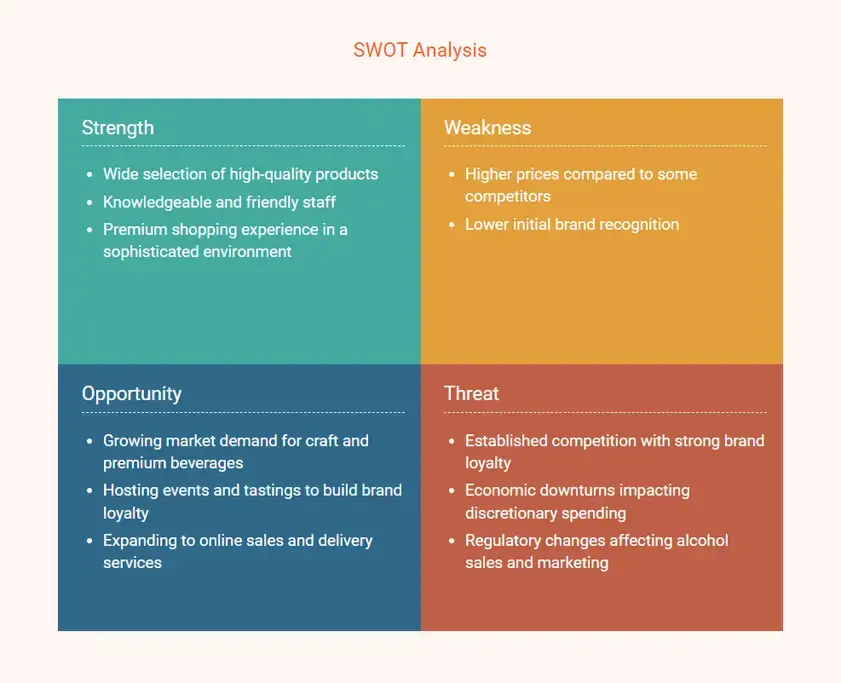
- Organization and management
Legal structure: Premium Spirits Liquor Store is registered as a Limited Liability Company (LLC), providing both flexibility in management and protection of personal assets.
The business is solely owned by Nash Rivers, who also serves as the General Manager.
Management team:
Nash rivers (owner/general manager).
Nash Rivers, with his background in retail management and love for quality wines and spirits, is the mastermind behind Premium Spirits Liquor Store. He is responsible for managing the store's general operations, strategic goals, and financial well-being.
Lyla Compton (Marketing Director)
Lyla Compton is in charge of creating and executing marketing plans. Drawing from her marketing expertise and deep knowledge of the retail beverage sector, she oversees social media strategy, marketing campaigns, and consumer interaction programs.
Garrett Snow (Operations Manager)
Garrett Snow is responsible for overseeing the store's daily operations to ensure efficiency. His duties involve overseeing staff, ensuring operational efficiency, and ensuring adherence to regulatory standards. He contributes useful expertise in operations management to the team.
Zachary Flynn (Inventory Manager)
Zachary Flynn oversees the store's stock, making sure there is a wide variety of products on the shelves. He manages relationships with suppliers, keeps track of stock levels, and supervises inventory control procedures. His careful method guarantees that the store consistently has the correct items in stock for customers.
Amelia Pike (Events Coordinator)
Amelia Pike is in charge of organizing and carrying out in-store functions, like samplings and launching new products. She is responsible for liaising with suppliers, marketing events, and ensuring a friendly environment for clients. Her skills in organizing events bring an exciting aspect to the store's products.
Organizational chart
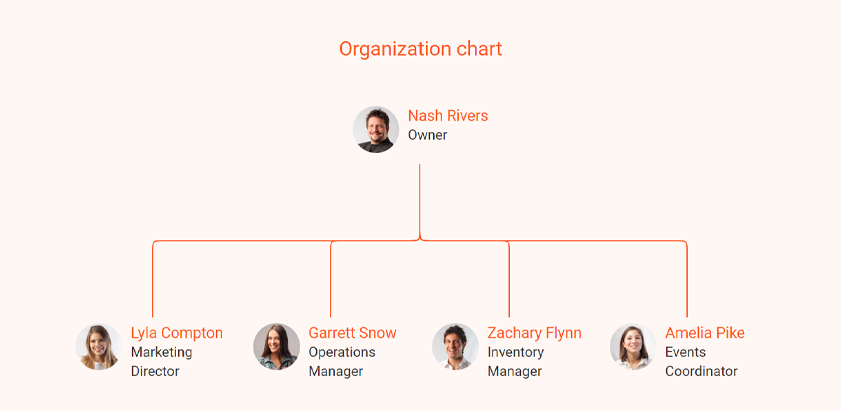
- Products or services
Wide selection of wines
Premium Spirits Liquor Store offers a curated collection of wines from renowned vineyards around the world. Our selection includes red, white, rosé, and sparkling wines, catering to both everyday enjoyment and special occasions.
Premium spirits and liquors
We provide a vast array of high-quality spirits, including whiskey, vodka, rum, gin, tequila, and more. Our inventory features both popular brands and rare finds, ensuring that every customer's taste and preference are met.
Craft beers
Our extensive selection of craft beers includes local favorites and unique brews from around the globe. We frequently update our offerings to include seasonal and limited-edition releases, appealing to craft beer enthusiasts.
Specialty and imported beverages
We provide a variety of specialty and imported beverages such as unique liqueurs, aperitifs, and non-alcoholic mixers for customers looking for a different experience. These items bring uniqueness and diversity to our stock.
Gift baskets and hampers
Our gift baskets and hampers can be customized to suit any event. Clients have the option to select from a variety of wines, spirits, beers, and gourmet snacks, all presented in a visually appealing manner to form a lasting present.
Unique Selling Points
Curated selection
Each product in our store is carefully selected by our knowledgeable staff to ensure quality and variety, offering customers a premium shopping experience.
Expert recommendations
Our team is well-versed in the products we offer and provides personalized recommendations based on customer preferences, enhancing the shopping experience.
Exclusive products
We stock exclusive and rare items that are difficult to find elsewhere, making Premium Spirits Liquor Store a destination for connoisseurs and collectors.
Superior customer experience
The store's sophisticated and welcoming atmosphere encourages customers to explore and enjoy their shopping experience.
Marketing plan
Social media platforms
Leverage Instagram and Facebook to showcase new arrivals, promotions, and events. Regularly post high-quality images and engaging content to attract followers and drive engagement. Use stories and live sessions for interactive customer experiences.
Targeted advertising
Run targeted ads on Google and social media platforms to reach potential customers based on their interests, demographics, and online behavior. Utilize analytics to track performance and optimize campaigns for better results.
In-Store events
Host tasting events, classes, and product launches to attract customers to the store and provide them with an immersive experience. Promote these events through social media, email newsletters, and in-store signage.
Membership and loyalty program
Implement a membership and loyalty program offering exclusive discounts, early access to new products, and special perks to encourage repeat business and build customer loyalty. Use data from the program to personalize marketing efforts.
Community engagement
Interact with the local community by sponsoring events, taking part in local festivals, and forming partnerships with local organizations. Demonstrate dedication to the community to establish a strong brand reputation and foster loyalty.
Sales strategy
Personalized customer service:
Train staff to provide exceptional customer service, including personalized recommendations and product knowledge. Create a welcoming atmosphere to encourage customers to return.
Product displays
Utilize attractive and informative product displays to highlight new arrivals, promotions, and best-sellers. Ensure products are easily accessible and well-organized to enhance the shopping experience.
Online sales and delivery
Provide convenient online ordering and delivery options to cater to customers who prefer shopping from home. Ensure the online store is easy to navigate and offers a seamless shopping experience.
Pricing strategy
Competitive pricing
Set competitive prices for mainstream products while maintaining premium pricing for exclusive and rare items. Regularly review and adjust pricing based on market trends and competitor analysis to stay competitive.
Value offers
Create value offers such as bundled products, seasonal promotions, and discounts for bulk purchases to attract price-sensitive customers and increase average transaction value.
The financial projections for Premium Spirits Liquor Store provide a roadmap for expected revenues, expenses, and profitability over the first three years of operation. These projections are based on market research, industry benchmarks, and realistic assumptions about the store's performance.
Assumptions:
- Initial Funding: $100,000 (combination of personal savings and a small business loan).
- Store Size: Approximately 1,500 square feet in a prime retail location in Austin.
- Average Transaction Value: $50.
- Customer Visits: Projected to start at 20 customers per day, increasing by 10% each quarter.
- Gross Margin: 50% on all products.
- Operating Expenses Growth: 5% annually.
- Inflation Rate: 2% annually.
Revenue projections:
Operating expenses:, net profit projections:, break-even analysis:, cash flow projections:, funding amount:.
Premium Spirits Liquor Store seeks an initial funding of $100,000. This amount will be sourced from a combination of personal savings and a small business loan.
Use of Funds:
Download the liquor store business plan template.
Ready to create your liquor store business plan but need a little help? We've got you covered! Download our free liquor store business plan template PDF and start building your plan today.
Designed specifically for liquor store owners, this template provides step-by-step guidance and practical examples to help you develop a strong and detailed business plan for your store.
We hope you've got a clear idea of all the essential components of a liquor store business plan, such as an effective executive summary, thorough market analysis, detailed marketing strategy, and realistic financial forecasts.
It should be easier for you to start writing a professional business plan for your liquor store.
But, if you're still confused or need help with formatting and presenting your plan, consider using an AI power business plan generator . It will help you prepare comprehensive business plans faster than ever. Just answer a few easy questions, and its AI assistant will generate your plan in minutes!
Get Your Business Plan Ready In Minutes
Answer a few questions, and AI will generate a detailed business plan.
Generate your Plan
Frequently Asked Questions
What financial projections are essential in a liquor store business plan?
There are notably various essential factors to consider in financial projection but a few important ones include:
- Cost of Goods Sold (COGS)
- Gross profit
- Operating expenses
- Cash flow projections
- Break-even analysis
What sections should be included in a liquor store business plan?
Here are sections you can include in your liquor store business plan:
- Exit strategy (optional)
How do I use my business plan to secure funding?
To secure funding with your business plan, clearly state the capital needed and how you’ll use it (e.g., inventory, store setup, marketing, and expenses). Show a strong market understanding with an analysis of demand and your competitive edge.
Provide financial projections that demonstrate potential profitability and cash flow, assuring investors of your business's viability. Lastly, have supporting documents like credit history and legal agreements ready to build trust.
What kind of visual aids should I include in my business plan?
You can use various visual aids to make your plan engaging and easier to understand, such as:
- Graphs, charts, and infographics: To illustrate financial projections, organizational structures, and other key overviews.
- Tables: To detail financial data, market analysis , and competitor comparisons.
- Images: To visualize store layout, product displays, and branding elements.
- Infographics: To summarize key points and data in a visually appealing way.
- Maps: To show store location, nearby competitors, and market area.

As the founder and CEO of Upmetrics, Vinay Kevadiya has over 12 years of experience in business planning. He provides valuable insights to help entrepreneurs build and manage successful business plans.
Follow Vinay Kevadiya
Related Sample Plans

Tattoo Shop Business Plan

Hotel Business Plan

Blog Business Plan

The quickest way to turn a business idea into a business plan

IMAGES
VIDEO
COMMENTS
Sample from Growthink’s Ultimate Liquor Store Business Plan Template: [Company Name], located at [insert location here] is a new liquor store focusing on providing beer, wine, and liquor curated by a knowledgeable staff.
Our mission is to establish a liquor store business that will make available a wide range of liquors, wines, and beers from top brands at affordable prices to the residence of Detroit – Michigan, and other cities in the United States of America and Canada where we intend opening
Download our free liquor store business plan sample template in PDF or Word Doc. Write a plan that works for retail and online alcohol sales.
Sample Business Plan for a Liquor Store. Below are links to each of the key elements of a liquor store business plan template: Executive Summary – The Executive Summary is the cornerstone of your business plan. This concise overview should encapsulate your liquor store’s core concept, financial projections, and strategic goals.
Download a sample liquor store business plan. Need help writing your business plan from scratch? Here you go; download our free liquor store business plan pdf to start. It’s a modern business plan template specifically designed for your liquor store business. Use the example business plan as a guide for writing your own.
Download our free liquor store business plan template PDF and start building your plan today. Designed specifically for liquor store owners, this template provides step-by-step guidance and practical examples to help you develop a strong and detailed business plan for your store.